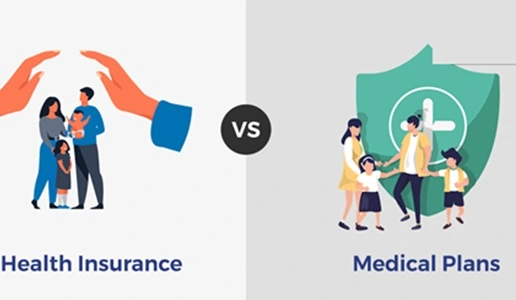When it comes to protecting yourself and your family against unexpected medical expenses, both health insurance and medical insurance are often mentioned. These two terms might sound similar, but they have significant differences. Understanding these differences can help you choose the right plan for your needs. In this article, we will explain what health insurance and medical insurance mean, and then look at the advantages and disadvantages of both.

Introduction to Health Insurance and Medical Insurance
Health insurance is a broader concept, covering various health-related risks. It offers comprehensive coverage, including hospitalization costs, pre- and post-hospitalization expenses, daycare procedures, and sometimes preventive care like vaccines and health check-ups. Health insurance policies also provide coverage for chronic illnesses or critical diseases, which might require long-term treatment.
On the other hand, medical insurance, also known as mediclaim, is more focused on specific medical expenses. It typically covers hospitalization due to illness or injury. Medical insurance is straightforward in its approach – it reimburses or directly pays for your hospital expenses up to a certain limit.
Now, let’s take a closer look at the advantages and disadvantages of both.
Advantages of Health Insurance
1. Comprehensive Coverage Health insurance provides wide coverage, including hospital charges, doctor’s consultation fees, ambulance costs, diagnostic tests, and sometimes even costs related to daycare treatments. This can be a huge relief in times of major illness or surgery.
2. Preventive Care and Health Check-ups Health insurance policies often come with preventive care benefits such as free health check-ups, vaccines, and screenings. This helps in early detection of diseases, which can lower future treatment costs.
3. Coverage for Chronic and Critical Illnesses Many health insurance policies offer add-ons or specific plans that cover critical illnesses like cancer, heart disease, or kidney failure. These diseases usually require long-term care, and having coverage for them ensures you don’t end up spending a lot from your savings.
4. Cashless Treatment Facility Most health insurance providers have tie-ups with hospitals to offer cashless treatment. This means you don’t have to worry about paying out of your pocket; the insurance company settles the bill directly with the hospital.
Disadvantages of Health Insurance
1. Higher Premium Costs Since health insurance offers more benefits and wider coverage, the premiums are generally higher compared to basic medical insurance. This can make it expensive for some families or individuals, especially for policies with high coverage limits.
2. Exclusions and Waiting Period Health insurance policies come with certain exclusions, such as cosmetic surgeries, pre-existing diseases, or maternity benefits, which may not be covered immediately. There is also a waiting period for certain conditions before coverage kicks in, which could range from a few months to a couple of years.
3. Complex Terms and Conditions Health insurance policies often come with detailed terms and conditions, which might be confusing. Policyholders need to carefully read through these conditions to avoid any surprises during a claim process.
Advantages of Medical Insurance (Mediclaim)
1. Lower Premiums Medical insurance usually comes with lower premiums compared to health insurance. If you’re looking for an affordable option that primarily covers hospitalization, medical insurance might suit your needs.
2. Focused on Hospitalization Medical insurance provides focused coverage for hospitalization expenses due to illness or accidents. It offers a straightforward reimbursement or cashless facility for your hospital bills, making it an ideal option for individuals who need basic hospitalization coverage.
3. Easy to Understand Since medical insurance is less complex than health insurance, it is easier to understand. The coverage is limited to specific medical needs, and the claims process is generally straightforward and hassle-free.
Disadvantages of Medical Insurance
1. Limited Coverage The biggest disadvantage of medical insurance is that its coverage is limited to hospitalization only. It does not cover outpatient care, diagnostic tests, pre- or post-hospitalization expenses, or critical illness treatment. This could lead to high out-of-pocket expenses for treatments outside the hospital.
2. No Preventive Care Medical insurance does not cover preventive care like health check-ups, vaccines, or screenings. This means that individuals may miss out on early disease detection or preventive treatments, which can be costly in the long run.
3. Capping on Room Rent and Other Expenses Medical insurance policies often come with caps on room rent and other hospital expenses. This means you may have to pay the difference if you choose a higher-category room or incur costs beyond the policy limit.
Which One Should You Choose?
When choosing between health insurance and medical insurance, it is important to assess your needs and budget. If you are looking for comprehensive coverage that includes hospitalization, preventive care, chronic disease coverage, and outpatient treatments, health insurance might be the better option for you. However, if you are looking for an affordable policy that covers basic hospitalization costs, medical insurance could work well.
Conclusion
Both health insurance and medical insurance have their own set of advantages and disadvantages. Health insurance offers a wider safety net with more coverage, but it comes at a higher cost. Medical insurance, on the other hand, is affordable but limited in scope. Understanding these differences will help you make an informed decision based on your health needs and financial situation. Always compare policies and consult with a professional advisor before purchasing to ensure you get the best coverage for yourself and your family.